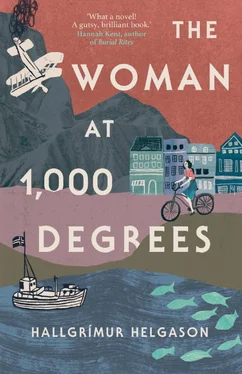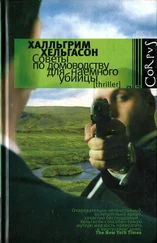‘Does a man called Gerhard Hauptmann live here?’
‘No.’
I pondered a moment.
‘But an American called Skewinson?’
‘No.’
But I could tell the guard was lying, and after some thought I finally dug into my pocket and took out the travelling funds that were supposed to buy my passage to Iceland on the next American ship home. Right, I wasn’t just some destitute orphan but a girl who was perfectly capable of taking care of herself and paying full fare. I stretched out my open palm and showed the tall soldier the precious Italian pearl from the days of Casanova. Rainbows glistened under the sun; its value remained unchanged. He snatched the pearl out of my hand and slipped it into his mouth, tried to chew it, but then swallowed.
I spent the night on a nearby heap of rubble. My hunt for food yielded nothing to chew on except the guard’s stupidity. Should I have treated him to the grenade? No, no doubt he would have gulped it down as effortlessly as the precious pearl – there’s no weapon against trollish imbecility of that kind.
I just cried in the dark and twice muttered ‘Mum’ with quivering lips, out loud. It gave me some comfort to hear someone say that word. The distance answered me with two flashes in the eastern sky, immediately followed by rumbles. I assumed them to be bombs, but it was obviously thunder because it was now starting to rain.
I crawled under a crumbled facade that leaned against the fragment of a wall that was firmly planted in the ground, thus creating a tiny cubbyhole padded with the smell of damp and dust. It was obviously risky to lie under this rubble, the whole thing could still collapse, but out of two bad options it was still better to die than to get drenched. I lay on my side – felt all my bones, how exhausted they were, lying on the stone like overused tools, probably the first premonition of death – and, famished, I stared into the rain-perforated darkness like some obscure animal dressed in a coat. The drops hollowed the stone relentlessly.
Finally, I fell asleep and, to tell the truth, slept remarkably well, so well that I woke up in amazement. When I wriggled out of my hole, only slightly damp on one side, I couldn’t immediately remember where I was and experienced a brief moment of bliss before rediscovering that I was registered as a resident in the Second World War. It couldn’t have been more than five or six, because the eastern sky was only starting to dawn red, the war was still sleeping, and there wasn’t a single bird about.
I leaned on a broken wall to contemplate myself from the distance of a whole lifetime, and behold, there I was, in a dirty coat and dusty ‘shoes,’ with a tattered red scarf around my neck: a girl in the flower of her youth, four months shy of turning fifteen, with a fickle gaze and lips ripe for life – beautiful and perfectly free, perfectly hungry, perfectly hopeless.
I held one leg straight and the other flexed over a rock; I placed a hand on my knee. It was a classical pose. Like an ancient Greek statue of some beautiful young goddess, except that I was alive and everything around me was made of marble, dead: crumbled houses, mounds of bricks, stone fragments. Even the leaves of the hedges that still protruded from the ashes had turned to rock, and the fly that sat on the broken iron had been carved in stone. Everything was dead and everything was silent. The world was empty and the emptiness was with me. I was a European adolescent at the vernal dawn of life. And so very lucky because this had been the worst spring in history. The legacy of generations had been razed to the ground. Everything that mankind had achieved, built up, and aspired to for a thousand years, everything that had delivered me into this world, had been wiped out.
Now everything was open, everything was possible – but fate offered me only one option: I felt that scar in the atmosphere, a scratch in that red dawn that lay between me and what was to be, a long scratch my life had to follow, like water that always seeks the next course down. Yes. All of a sudden I was overcome by the deep certainty that this beautiful marble day would lead to my ruin.
I walked back to the building that still stood on Bühlstraße and saw that there was no guard standing there now. I tried the hall door but it was locked. Then I walked around the building and finally sat on some stone, waiting for the sun to bring out its shadow. After about an hour a woman staggered across the ruins and leaned against the steps. The guard violently pushed her away as he appeared out of the building and resumed his position.
I waited another two to three hours, but the giant idiot didn’t budge to so much as take a piss. Finally hunger yelled so desperately inside me that I started walking towards ‘the city,’ to a place where buildings were still standing. In a dilapidated courtyard I spotted several women sitting over a pot. I stared at the group until they signalled me over to chew on some of the strange meat, and I didn’t ask whether it was from a dog or a rat.
I thanked them and roamed down a narrow street. Both sides were lined with windowless facades like stage flats. On a dark porch two children were squabbling over a loaf of bread, a struggle that ended when one vomited on the other. Further down the street was a bookstore. The covers and spines of the books were covered in stone dust, making them look like a continuous body of work in a thousand tomes. I grabbed one of them and hid deep in the shop, falling asleep and waking up in a work by Schiller, while tanks rolled down the street.
It was growing dark and my stomach started howling again. But once more, luck was on my side; by some happy accident I stumbled on a rare find in some other ruins: the darkness revealed a glistening white egg to me, unbroken and hard boiled – how was that possible? I ate it in its shell in three bites. Then I spotted a grisly woman crouched over a crumbled fireplace, grinning at me with yellow teeth.
‘Are you homeless? Follow me.’
Stepping through the back door, we entered a reasonably intact six-storey building. Most of the other houses on the street were roofless, and one of them was missing some floors. Soldiers sat on the steps outside, smoking in silence, but yelled something at us when they saw us vanish around the corner of the house. Russians, as far as I could make out. In the backyard lay the body of a young boy. Birds had flown away with his eyes. Black smoke bloomed in the next garden, like a beautiful war flower. The woman’s name was Birgitte and she was having trouble climbing the stairs, taking just one step at a time and apologising with a snorting smile: ‘Russian pain.’
In the corner of a landing, a piece of human excrement collected flies, exuding a stink. We stepped straight into an old yellow kitchen on the third floor, where her mother sat drinking and rejoiced at my arrival. ‘ Frische Schönheit! A fresh beauty!’ And poured her tufty-haired self a strong one. There was a tooth missing in her grin and no glass in the window frame. The mother and daughter were from Stettin and had once been major pavement beauties over there, but now the older one had virtually turned into a man and the younger one into a boy. They snapped at each other in a dialect I couldn’t understand. But then smiled at me and pronounced a toast. I sipped on the firewater and held it down until the meal arrived, the first since I had been hosted by a friendly family in the town of Poznán sometime in that long winter. I threw it all up out of a skylight on the sixth floor. The moonlight illuminated the vomit. I looked out at the dark ruins of the city and listened to its sighs. There was no getting away from it, it was blatantly obvious: the city was breathing its last. No planes could be heard in the sky, and the air was pregnant with a deafening buzz, like the epilogue to some great commotion. In the distance I could hear the faint sound of a church tower collapsing, and someone shouted out a window: ‘ Der Führer ist tot! The Führer is dead!’ Later that night and the morning after, the Red Army streamed in with shouts of victory and Cossack songs.
Читать дальше












